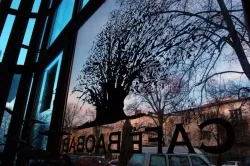Aid-el-Kebir is the biggest musulman holiday. This religious festivity is celebrated at the end of the pilgrimage to Mekka (hadż) and relates to the gesture of Ibrahim (Abraham) and his obbediance to God. According to Islam, Ibrahim was supposed to sacrifice his son Izmael to Allah, but God, seeing his devotion let him sacrifice a ram instead of the baby. From there comes the Festival of the Sacrifice or the Holiday of the Ram, which means – the day of happiness and sharing with your family and neighbours. In Senegal (where 90% of the population is Muslim) this holiday is better known as Tabaski. This name is kept in the wolof language, which is quite original in the muslim world, where the arabic terminology tends to dominate. Not everybody has the possibility of staying with their closest ones, though. Far away from their country, people still cope and try to celebrate. The Senegali diaspora in Warsaw usually meets in a private house of one of its members. This year though the celebration took place in Cafe Baobab in the Saska Kępa district. It's a very cosy place, where the decor creates a special atmosphere. All of that is emphasised by exotic smells, drinks and music.
According to tradition, earlier on, money was collected to buy a ram. Lamb is very popular in muslim countries, where religion doesn't allow eating pork.
Guests came to Cafe Baobab quite early. People in Senegal don't usually meet at a precise hour. They prefer to say „ci suba” („in the morning”), „ngoon si” („late in the afternoon”) or „timis gudi gi” („in the evening”). Nobody says: 4PM, 6PM nor 9PM.
You know what, I'd love to be in Dakar today! Can you imagine the atmosphere? There's more excitement than before Christmas in Poland. Everybody's on the street. It's a joyful feast, even though it requires expences on the part of the head of the family, who needs to buy a ram and clothes for the children. Imagine a guy with two wives and a bunch of kids. Everybody's out on the street, money's circulating faster and traffic paralises the city sometimes. - Abdulaye says.
I'm sorry we're not there – adds Massamba – the salesmen of sheep put their stock everywhere, clothes are especially made and not bought, so sewers have to work late at night to keep up with all of the orders. All of the conversations in the buses or in lines outside the banks (for loans) concern the prices and the health of the rams. I like it when children wash the ram at dusk, and then tie it outside of the house and in the morning people from all around go to the mosk, well dressed, to pray together.
Women go to the mosk as well? - Tomek asked, a regular at Cafe Baobab.
No! Just men, boys and elderly women.
We were all sitting at a long table with friends from Gambia and Poland. Azir served us drinks: bissap, made of hibiskus, buj made of baobab fruit and ginger juice. Senegali music mbalax filled our ears with joy. We were talking in wolof, french and, obviously, in polish. Next to our table other clients ordered mafe – a dish made with meat, rice and vegetables in peanut sauce, and akra – appetizers made of beans, formed into little balls in a spicy pepper sauce. I don't like this kind of pepper because it's so hot that it burns your tongue. As they say in my homeland: „heaven and fire in your mouth”.
A few minutes later the festive thiebu yap was served. In Senegal many names of dishes contain the word „thieb” - „rice”. In the villages people eat a lot of millet, but in towns rice is the key ingredient. Fish is also very popular, due to the nearness of the Atlantic Ocean. Meat (mostly lamb) on the other hand, is quite expensive.
Thieb ban gi nëw! - Aziz's assistant shouted from the kitchen. We emptied the table, waiting for lamb and rice to arrive. The table wasn't round, so we couldn't all eat from one bowl (bol) as families do in our country and everybody got their own plate. Long live Tabaski! The time to feast has arrived. It was our own Tabaski in Warsaw, at Saska Kępa.
Aziz yaako yor! - The best one! - someone praised the cook.
Dziotalima kanigi! - Pass the pepper! Now I feel at home – Malik said. The food was amazing. We were happy tasting the almost forgotten senegali food. I didn't even realise I missed it so much.
Attaya bi! The time has come for the traditional tea ceremony, divided into three parts. First glass – lëwël – is quite bitter, the second one - sweet and very strong and the third one, a little lighter. Attaya is a cooked, green tea with fresh mint leaves, served like in North Africa. After tea comes the time of wishes and common forgiveness.
Deweneti! Let's hope we meet here again next year!
Text by Mamadou Diouf
Translated by Natalia Mętrak

















